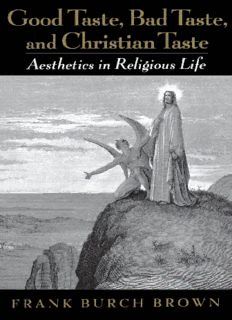
Good Taste, Bad Taste, and Christian Taste: Aesthetics in Religious Life PDF
Preview Good Taste, Bad Taste, and Christian Taste: Aesthetics in Religious Life
GOOD TASTE, BAD TASTE, & CHRISTIAN TASTE This page intentionally left blank GOOD TASTE, BAD TASTE, & CHRISTIAN TASTE Aesthetics in Religious Life Frank Burch Brown OXFORD UNIVERSITY PRESS 2OOO OXPORD UNIVERSITY PRESS Oxford New York Athens Auckland Bangkok Bogota Bombay Buenos Aires Calcutta Cape Town Dar es Salaam Delhi Florence Hong Kong Istanbul Karachi Kuala Lumpur Madras Madrid Melbourne Mexico City Nairobi Paris Singapore Taipei Tokyo Toronto and associated companies in Berlin Ibadan Copyright © 2000 by Frank Burch Brown Published by Oxford University Press, Inc., 198 Madison Avenue, New York, New York 10016 Oxford is a registered trademark of Oxford University Press All rights reserved. No part of this publication may be reproduced, stored in a retrieval system, or transmitted, in any form or by any means, electronic, mechanical, photocopying, recording, or otherwise, without the prior permission of Oxford University Press. Library of Congress Cataloging-in-Publication Data Brown, Frank Burch, 1948- Good taste, bad taste, and Christian taste : aesthetics in religious life / Frank Burch Brown. P. cm. Includes bibliographical references and index. ISBN o-i9-5i36n-X i. Christianity and the arts. 2. Aesthetics—Religious aspects—Christianity. I. Title. BRH5.A8 6785 2000 246—dc2i 99-086563 Selections from The Divine Comedy of Dante Alighieri: Paradiso, trans, by Allen Mandelbaum. Translation copyright © by Allen Mandelbaum. Used by permission of Bantam Books, a division of Random House, Inc. "Crow's Theology," from Crow by Ted Hughes. Copyright (1971) by Ted Hughes. Used by permission of Faber and Faber Ltd. "Black Rook in Rainy Weather," from Collected Poems by Sylvia Plath. Copyright © 1980 by Ted Hughes. Used by permission of Faber and Faber Ltd. And from Crossing the Water by Sylvia Plath, Copyright © 1960 by Ted Hughes. Reprinted by permission of HarperCollins Publishers, Inc. One of Us, by Eric Bazilian © 1995 Human Boy Music (ASCAP) All Rights Administered by WB Music Corp. All Rights Reserved. Used by Permission WARNER BROS. PUBLICATIONS U.S. INC., MIAMI, FL. 33014 1 3 5 7 9 8 6 42 Printed in the United States of America on acid-free paper TO DAVID AND TO CAMILLA This page intentionally left blank Contents Prologue: Religious Taste ix One Good Taste, Bad Taste, and Christian Taste 3 Two Art in Christian Traditions 26 Three From the Love of Religion to the Love of Art 62 Four The Taste for Art and the Thirst for God 95 Five Kitsch, Sacred and Profane: The Question of Quality 128 Six Ecumenical Taste: The Case of Music 160 Seven Making Sacred Places, and Making Places Sacred 199 Eight Styles and Stages of Faith and Art I: The Next Stage 217 Nine Styles and Stages of Faith and Art II: Practicing Christianity Artfully 252 Notes 271 Index 301 Figure 1. Gustave Dore (1832-1883), The Empyrean (Dante and Beatrice behold the Celestial Rose, Par. XXXI). From the Dore illustrations for Dante's Divine Comedy, 1861. (Dover Pictorial Archive Series) Prologue Religious Taste Shared Taste: A Memoir Taste may be subjective, but it is not merely private. Almost from the time of our earliest exchanges, my brother David and I have regularly attempted (with varying degrees of success) to share music we relish. Sometimes our efforts have been strenuous. Once we backpacked into the Uinta Mountains of Utah and at long last sat perspiring on a remote peak. There—using two pairs of headphones, an adapter plug, and a portable cassette player—we compared several differ- ent (but all remarkably elevated) performances of the "Sanctus" from Bach's Mass in B Minor. That lofty concord and mutuality of tastes has plummeted at other times into abysmal discord and disagreement. My tastes in "classical" art and music have been eclectic and almost omnivorous, his more selective and discriminating. And I have always taken a greater interest than he in jazz and popular music, and in music worldwide. When serving as a composer-in-residence at various churches, I occasionally wrote music that he found too popular in its appeal, and there- fore (to him) unappealing. But we have found that these conflicts in taste, a predictable feature of any shared passion for the arts, can also be fruitful. And our passion for the arts has persisted, having become integral to our lives more generally. David became a professional pianist, music teacher, and composer; I became a scholar-teacher in religion and the arts with opportunities to compose, direct a choir, and make music with the piano and sundry other instruments. For both of us the arts (and not only music) have provided what one could fairly call "spiritual exercise." They have also served as a primary religious language. Sometime before David's eighteenth birthday, he confessed—pro- fessed, really—that were it not for Handel's Messiah he would probably not have had the capacity to remain a Christian up to that point. Odd as that may ix
Description: